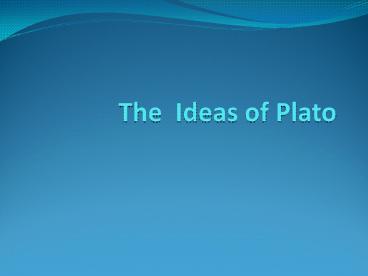The Ideas of Plato - PowerPoint PPT Presentation
1 / 6
Title:
The Ideas of Plato
Description:
Plato believed. Most of us have only partial and unclear knowledge. Human beings could attain true knowledge. In the existence of a single moral truth (like Socrates) – PowerPoint PPT presentation
Number of Views:209
Avg rating:3.0/5.0
Title: The Ideas of Plato
1
The Ideas of Plato
2
How Powerful is Platos Influence
- according to Alfred North Whitehead all
philosophy is nothing more than a footnote to
Plato. - Plato was a student of Socrates, gained a passion
for philosophy - After Socrates death, Plato set up his Academy
- Knowledge is developed refined through
discourse and questioning - Unlike Socrates, Plato documented his ideas
3
The Analogy (Allegory/Myth) of the Cave (Sproule
p.75-76)
4
Plato believed
- Most of us have only partial and unclear
knowledge - Human beings could attain true knowledge
- In the existence of a single moral truth (like
Socrates) - In the existence of a single connected truth
about everything in the universe - Knowledge divided in two categories
5
Platos Two Categories of Knowledge
- Of Visible World
- Of The Real Ideal World
- Achieved via senses
- Subject to change
- Based on opinion
- Of less value
- The world of experience includes what we imagine
or believe might be true - objects of this world are images
- Achieved via rational thought
- Permanent
- Based on reality/ BEING
- The greater truth
- Lower form of knowledge from mind is world of
thinking (induction) - Highest form of knowledge that of The Good how
all things are connected
6
A person who knows The Good
- Doesnt rely on the imperfect visible world for
information - All knowledge is acquired through the working of
the mind - Therefore, Plato is a RATIONALIST, since it is
through reason and not the senses that we acquire
the highest knowledge and wisdom. - Read Platos Theory of Form Change p. 79-80
and Platos Theory of Aquiring Knowledge p. 80



























![get⚡[PDF]❤ Epistemology after Protagoras: Responses to Relativism in Plato, Aristotle, PowerPoint PPT Presentation](https://s3.amazonaws.com/images.powershow.com/10051075.th0.jpg?_=202406080911)



